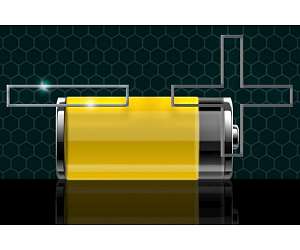The sale of electric vehicles (EV’s) has grown exponentially in the past few years as is the need for renewable energy sources to power them, such as solar and wind. There were nearly 1.8 million registered electric vehicles in the U.S. as of 2020, which is more than three times as many in 2016, according to the International Energy Agency (IEA).
Electric vehicles require power to be available anywhere and anytime without delay to recharge, but solar and wind are intermittent energy sources that are not available on demand. And the electricity they do generate needs to be stored for later use and not go to waste.
That’s where Dr. Yu Zhu, a professor in The University of Akron’s School of Polymer Science and Polymer Engineering, and his research team come in, by developing a more stable way to store this important energy.
Just as the gas station today, electricity power stations need a storage system to keep the electricity for EV constantly charging. Low cost, scalable redox flow batteries (RFB) are among the most suitable technology for such a system; however, current RFBs use high-cost and environmentally hazardous active materials (electrolytes).
Recently, water-soluble organic materials have been proposed as future electrolytes in the RFBs (namely aqueous organic RFBs, or AORFBs). Organic-based electrolytes can be obtained from renewable sources and manufactured with very low cost. However, the lack of stable water-soluble organic electrolyte materials, particularly the positive electrolyte (catholyte), is a major hurdle of AORFBs.
Zhu’s research group, in collaboration with scientists in Pacific Northwestern National Laboratory led by Dr. Wei Wang, successfully developed the most stable catholyte (positive electrolyte) to date in AORFBs and demonstrated cells that kept more than 90% of capacity over 6,000 cycles, projecting more than 16 years of uninterrupted service in a pace of one cycle per day. Their research was recently published in Nature Energy and included contributions from Zhu’s doctoral students Xiang Li and Yun-Yu Lai.
“Development of high-performance RFBs will enrich the category of electricity energy storage systems and complement the shortcoming of intermittent renewable energy sources, therefore largely improving the usability of electricity powered facilities, such as vehicles,” says Zhu. “To significantly improve the performance of aqueous organic RFBs, the urgency of developing new catholyte is crucial.”
In the Nature Energy paper, the team not only demonstrated a state of art catholyte in AORFBs, but also provided a brand-new strategy to design water soluble catholyte to enhance their solubility (energy density) in water.
Instead of attaching a hydrophilic functional group to improve the solubility of the molecules, the researchers change the symmetry of molecules, which results in a dramatic enhancement of solubility. With the new design strategy, the team plans to design new materials they can further mature the RFBs.
A patent application has been submitted based on the technology developed in this research. The scalability of the materials will be further studied in Akron PolyEnergy Inc., a spin-out company from UA co-founded by Zhu that focuses on the development of materials in energy storage devices including lithium-ion batteries and flow batteries.
Related Links
University Of Akron
Powering The World in the 21st Century at Energy-Daily.com
|
We need your help. The SpaceDaily news network continues to grow but revenues have never been harder to maintain. With the rise of Ad Blockers, and Facebook – our traditional revenue sources via quality network advertising continues to decline. And unlike so many other news sites, we don’t have a paywall – with those annoying usernames and passwords. Our news coverage takes time and effort to publish 365 days a year. If you find our news sites informative and useful then please consider becoming a regular supporter or for now make a one off contribution. |
||
|
SpaceDaily Contributor $5 Billed Once credit card or paypal |
SpaceDaily Monthly Supporter $5 Billed Monthly paypal only |
|

![]()
Europe to boost battery production as electric shift accelerates
Paris (AFP) July 25, 2021
As electric car sales take off and petrol engines face being phased out by 2035, Europe is looking to develop its own battery production base.
Far from being autonomous, Europe needs to accelerate domestic battery output as a national security issue as well as a boost for businesses and jobs.
Batteries that power electric cars and which weigh up to 600 kilograms (1,300 pounds), represent a considerable part of the vehicle’s value.
At the moment, they are mostly produced in Asia, with China, … read more
